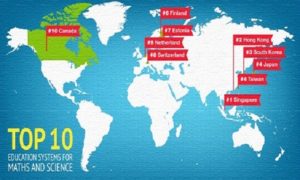An international benchmarking study, Trends in International Mathematics and Science Study (TIMSS) released a report on November 29, 2016 that, Singapore students are the world’s best in Mathematics and Science.
- The test was administered by the International Association for the Evaluation of Educational Achievement, a non-profit research cooperative based in Amsterdam.
- This is the second time that students of Singapore performed best those from all other countries in TIMSS, which takes place every four years. The last time this country stood first was in 2003.
- The latest cycle of TIMSS was conducted in 2015 in Northern Hemisphere countries. About 6,500 Primary 4 students (Age 9-10) and 6,100 Secondary 2 students(Age 13-14) across all 179 schools in Singapore participated in the latest TIMSS 2015 test. They were among over 582,000 students from 64 education systems tested worldwide.
Result of TIMSS 2015 :
Singapore’s Primary 4 pupils had the highest mean score of 618 in Maths, with those in Hong Kong stood second with a score of 615.
- Again Primary 4 pupils of Singapore attained the best score of 590 in science, beating those in South Korea, which had 589.
- Singapore secondary 2 students were also ranked first with top scores of 621 and 597 for mathematics and science respectively, beating students in South Korea and Japan which came in second.

- The proportion of students with the lowest score of below 400 in Singapore was also much smaller than the international average. Just 1 per cent of Singapore students scored below 400 for Primary maths, for instance. The global average was 7 per cent.
- Singapore students are getting better in tackling non-routine questions and those requiring them to apply knowledge. Educators attributed these improvements to schools focusing more on inquiry-based teaching and learning over the last decade.
- The results revealed that England has improved in both science and maths, with the country’s maths results now at their highest point for 20 years in both age groups.
- From the first assessment in 1995 to the most recent in 2015, England’s score increased by 12.8 per cent (from 484 to 546) for nine to 10 year-olds, with a 4 per cent improvement (from 498 to 518) for 13 to 14 year-olds.
The difference between the top performing countries and the next highest performers is 23 points for the younger age group and 48 points for the older students.
List of Top 5 Countries:
| Secondary Maths | Secondary Science | Primary Maths | Primary Science |
| 1. Singapore | 1. Singapore | 1. Singapore | 1. Singapore |
| 2. South Korea | 2. Japan | 2. Hong Kong | 2. South Korea |
| 3. Taiwan | 3. Taiwan | 3. South Korea | 3. Japan |
| 4. Hong Kong | 4. South Korea | 4. Taiwan | 4. Russia |
| 5. Japan | 5. Slovenia | 5. Japan | 5. Hong Kong |
The Trends in International Mathematics and Science Study (TIMSS)
The Trends in International Mathematics and Science Study (TIMSS) is an educational research study on student achievement in mathematics and science around the world.
- TIMSS is conducted under the auspices of the International Association for the Evaluation of Educational Achievement (IEA), which is an independent international co-operative of national research institutions and government agencies. The Ministry of Education’s Comparative Education Research Unit manages the implementation of the TIMSS studies in New Zealand.
- It is designed to measure and interpret differences in national educational systems in order to help improve the teaching and learning of mathematics and science worldwide. In 1994, TIMSS began the first study and thereafter it is held once every four year.
- TIMSS assesses achievement in mathematics and science of middle primary (Age 9-10) and lower secondary (Age 13-14) levels, and collects background information on student, classroom and school contexts through questionnaires.


